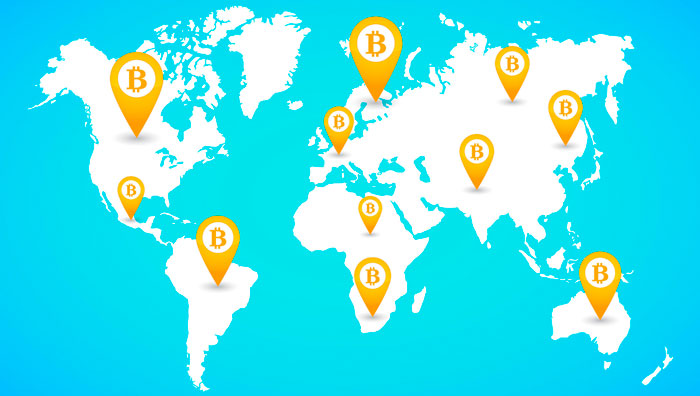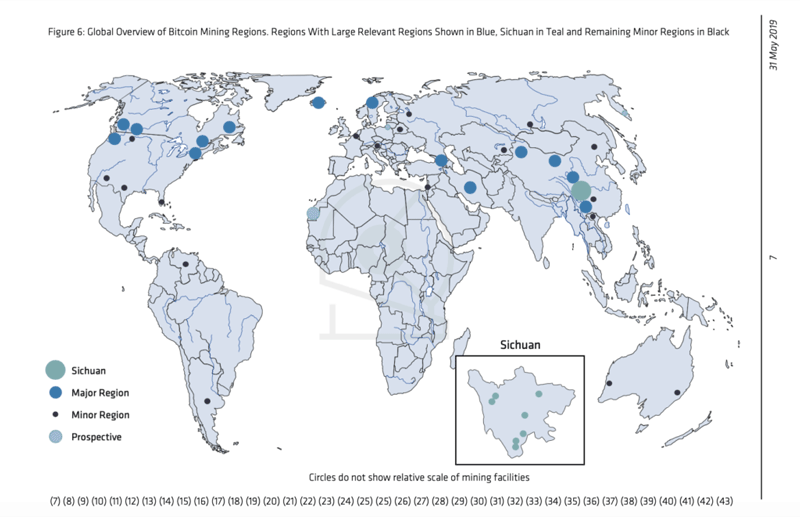
Most of what you will read about cryptocurrency mining will be about mining in China and North America.America. Nevertheless, there is a relatively small but growing percentage of mining capacities in those parts of the world that we do not hear about so often: Norway, Scotland, Paraguay, Georgia and Siberia.
Currently, China accounts for about 60% (previously this figure reached 80%) of global Bitcoin mining.
Since 2017, a Chinese mining companyBitmain hosts mining centers in other countries and actively cooperates with foreign mining companies. Bitmain recently announced the launch of a new mining center in Texas, which the company says will be the world's largest Bitcoin miner with a capacity of 50 MW. To launch the mining center, Bitmain entered into a partnership with the Canadian company DMG and attracted investment from Peter Thiel.
Opening of a large center in the USA by a Chinese mineris part of a broader trend of decentralization of Bitcoin mining around the world. Bitmain is now even offering its services to other mining companies that want to relocate or start operations in other countries. The company has developed a map - the World Digital Mining Map - as a directory of promising locations for opening mining centers, which lists power sources and other specifications.
What are mining companies oriented to?
The main indicator, of course, isstable source of inexpensive electricity. A May 2019 report from analytics firm CoinShares noted: “The pursuit of the cheapest electricity remains the cornerstone for competitive advantage in Bitcoin mining.”
At the same time, miners are increasingly attractedrenewable sources of electricity (hydroelectric power, wind energy, solar energy). According to a Coinshares report, renewable energy accounts for about 74.1% of bitcoin mining.
Another indicator is the cold climate,which reduces equipment cooling costs, although recent technical improvements make this factor less important. The climate of Norway, Iceland and Siberia is best suited for mining companies that are considering the decentralization of their capacities.
Another important factor is regulation.cryptocurrencies and the political situation in the country. For example, due to the political crisis in Venezuela, miners cannot be completely confident in their investments, while Iceland is likely to be a more stable country in the foreseeable future.
Where is Bitcoin mined today?
Given all these priorities, many minersdecided to move or open their centers in places far beyond China and North America. Here is a brief overview of some of the most promising countries and regions:

Siberia
Siberia is a growing international centerfor mining bitcoin on the site of former factories and near hydroelectric power stations. Relatively cheap tariffs for electricity and the Siberian climate attract miners from other countries.
According to recent studies, Russian miners account for 10% of the bitcoin network capacity (about 600 MW).
Norway
The German company Northern Bitcoin now houses its facilities inside a former metallurgical mine called Lefdal, where it now operates a data center.
Cheap renewable energy generatedhydropower plants in the fjords. Norway’s northern climate allows miners to more efficiently cool equipment. In addition, the Norwegian government is very positive about bitcoin.
Scotland
Scotland is actively launching offshore wind farms to produce low-cost renewable energy.
Small mining center in the southwesternScotland, located close to the sea, hopes to expand its operations when more renewable wind energy becomes available. In a politically neutral environment, there are no restrictions on Bitcoin mining.
Georgia
Georgia is known for its friendly attitude towards Bitcoin and cryptocurrencies. During the last bull market in 2017, it ranked third in the world in Bitcoin mining, behind China and the United States.
BitFury, one of the world's largest manufacturers of mining equipment, operates here. The government welcomes Bitcoin mining and has adopted a comprehensive blockchain strategy.
Paraguay
The Paraguayan government is encouraging bitcoin mining, hoping to make the country a global mining center. A lot of cheap electricity comes from two large hydropower plants: Itaipu and Yatsireta.
According to Bitfury, which is partnering withThe South Korean company Commons Foundation has launched several mining centers in this country, Paraguay now uses only half of the electricity generated by these two hydropower plants.
Venezuela
The main advantage of bitcoin mining inVenezuela is a very low cost energy. Recently, the government expressed interest in using Bitcoin in addition to Petro’s own digital currency to pay for government spending, as the country faced international sanctions and the economy was in a very difficult situation.
Miners have been active in Venezuela since 2014and have formed a fairly large community, but a recent thread on Bitcointalk raised concerns about government policies that are planning to tighten controls on mining.
Iceland
The climatic conditions of Iceland are well suitedminers, while hydropower and geothermal power plants are a stable source of renewable energy. However, the recent increase in miner activity is still a concern for local ecologists.
An international community of miners has long been formed in the country. Genesis Mining has been operating in Keflavik since 2014.
Decentralization of mining: why is it important?
Decentralization is one of the key principlesbitcoin. Bitcoin is a decentralized system, but mining itself is still quite centralized in China. The increase in decentralization reduces the potential impact of an individual government on mining.
The negative attitude of the Chinese government towardsBitcoin and cryptocurrencies as a whole caused many cryptocurrency companies to leave the country, while miners began the process of decentralization, but there is still a long way to go. It is known that the country's authorities are considering a ban on mining in the country, although the most recent data indicate that China does not plan to ban the extraction of cryptocurrency.
</p>




